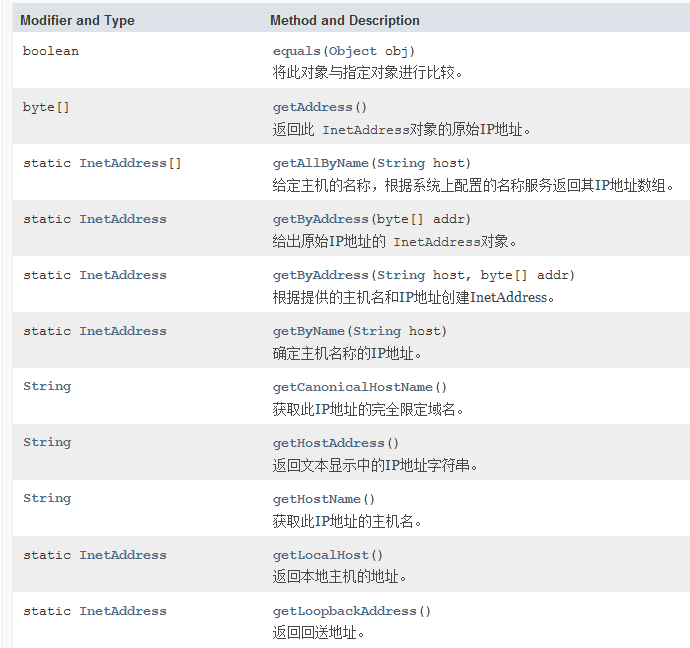Socket 是一个通信链路的端点,它提供给应用程序互相访问的接口,它处在java.net包下.
InetAddress 类:IP地基于TCP的Socket编程用到的类
测试InetAdress的上述函数
package com.qf.demo;
import java.net.InetAddress;
import java.net.UnknownHostException;
/**
* 测试本机 的地址
* localhost
* 127.0.0.1
*
* @author Administrator
*
*/
public class Test {
public static void main(String[] args) {
try {
// 得到本机的信息
InetAddress inetAddress = InetAddress.getLocalHost();
// 得到主机名
String name = inetAddress.getHostName();
System.out.println(name);
// 得到主机的ip地址
String address = inetAddress.getHostAddress();
System.out.println(address);
InetAddress inetAddress2 = InetAddress.getByName("www.baidu.com");
System.out.println(inetAddress2.getHostName());
System.out.println(inetAddress2.getHostAddress());
InetAddress inetAddress3 =InetAddress.getByName("localhost");
// 如果获取不到主机名 主机名是展示的是ip地址
System.out.println(inetAddress3.getHostName());
System.out.println(inetAddress3.getHostAddress());
} catch (UnknownHostException e) {
// TODO Auto-generated catch block
e.printStackTrace();
}
}
}
Socket应用
- 客户端发送数据给服务端
- 1 创建Socket
- 2 准备发送的数据
- 3 将数据放到socket中
- 4 (调配物流车, 物流车送货)
- 5 关闭socket
*注意: 先运行 服务端 在运行客户端
客户端代码
public class Client {
public static void main(String[] args) {
//1 创建Socket
Socket socket = null;
OutputStream os =null;
try {
System.out.println("客户端起来了");
socket = new Socket("127.0.0.1", 6666);
// 2 准备发送的数据
String string = "hello world";
// 3 将数据放到socket中
os = socket.getOutputStream();
// 将数据交给快递员写给快点点
os.write(string.getBytes());
os.flush();
} catch (UnknownHostException e) {
// TODO Auto-generated catch block
e.printStackTrace();
} catch (IOException e) {
// TODO Auto-generated catch block
e.printStackTrace();
}finally{
if(os!=null){
try {
os.close();
} catch (IOException e) {
// TODO Auto-generated catch block
e.printStackTrace();
}
}
if(socket!=null){
try {
socket.close();
} catch (IOException e) {
// TODO Auto-generated catch block
e.printStackTrace();
}
}
}
}
}
- 服务端接收数据
- 1 创建服务端的快递点
- 2 等待接收数据
- 3 接收到数据 , 就可以从快递点拿出数据
- 4 关socket
服务器端代码
public class Server {
public static void main(String[] args) {
// 1 创建服务端的快递点
ServerSocket serverSocket =null;
Socket socket = null;
InputStream is =null;
try {
System.out.println("服务端起来了");
serverSocket = new ServerSocket(6666);
// 2 等待接收数据
socket = serverSocket.accept();// 如果没有接收到数据, 阻塞程序执行, 直到接收到数据
// 3 接收到数据 , 就可以从快递点拿出数据
is = socket.getInputStream();
byte[] bs= new byte[1024];
int num = is.read(bs);
String string = new String(bs, 0, num);
System.out.println("服务端接收到的数据是: "+string);
} catch (IOException e) {
// TODO Auto-generated catch block
e.printStackTrace();
}finally {
if(is!=null){
try {
is.close();
} catch (IOException e) {
// TODO Auto-generated catch block
e.printStackTrace();
}
}
if(socket!=null){
try {
socket.close();
} catch (IOException e) {
// TODO Auto-generated catch block
e.printStackTrace();
}
}
if(serverSocket!=null){
try {
serverSocket.close();
} catch (IOException e) {
// TODO Auto-generated catch block
e.printStackTrace();
}
}
}
}
}
当我们运行服务器的时候服务器会等着接受Socket,如果没有则进入阻塞状态
当我们运行客户端的时候将数据给Socket那么服务端就会由阻塞进入就绪状态,然后进入执行状态执行下面的代码
那么服务端可不可以和客户端进行互相通信呢
下面的例子就是互相通信的
客户端
package com.qf.demo4;
import java.io.IOException;
import java.io.InputStream;
import java.io.OutputStream;
import java.net.Socket;
import java.net.UnknownHostException;
import java.util.Scanner;
import com.qf.demo3.Util;
/**
* 控制台循环输入数据 发送给 服务端
*
* @author Administrator
*
*/
public class Client {
public static void main(String[] args) {
// 1 创建快递点
Socket socket = null;
OutputStream os = null;
InputStream is = null;
try {
socket = new Socket("10.0.143.51", 8888);
// 2 准备要发送的数据
Scanner scanner = new Scanner(System.in);
// 3 获得快递员
os = socket.getOutputStream();
is = socket.getInputStream();
while (true) {
String data = scanner.next();
os.write(data.getBytes());
os.flush();
if ("over".equals(data)) {
break;
}
// 收到回信
byte[] bs = new byte[1024];
int num = is.read(bs);
String reault = new String(bs, 0, num);
System.out.println("服务器回复的数据是 : " + reault);
if ("over".equals(reault)) {
break;
}
}
} catch (UnknownHostException e) {
// TODO Auto-generated catch block
e.printStackTrace();
} catch (IOException e) {
// TODO Auto-generated catch block
e.printStackTrace();
}finally {
Util.closed(null, socket, is, os);
}
}
}
服务端
package com.qf.demo4;
import java.io.IOException;
import java.io.InputStream;
import java.io.OutputStream;
import java.net.ServerSocket;
import java.net.Socket;
import java.util.Scanner;
import com.qf.demo3.Util;
public class Server {
public static void main(String[] args) {
// 1 创建 服务端的socket
ServerSocket serverSocket = null;
Socket socket =null;
InputStream is =null;
OutputStream os = null;
try {
serverSocket = new ServerSocket(8888);
// 2 等待接收客户端的数据
socket = serverSocket.accept();
is = socket.getInputStream();
os = socket.getOutputStream();
Scanner scanner = new Scanner(System.in);
// 3 读取信息
while(true){
byte[] bs = new byte[1024];
int num = is.read(bs);
String string = new String(bs, 0, num);
System.out.println("客户端发送了: "+string);
if("over".equals(string)){
break;
}
// 以下是回复数据
String result = scanner.next();
os.write(result.getBytes());
os.flush();
if("over".equals(result)){
break;
}
}
} catch (IOException e) {
// TODO Auto-generated catch block
e.printStackTrace();
}finally {
Util.closed(serverSocket, socket, is, os);
}
}
}
